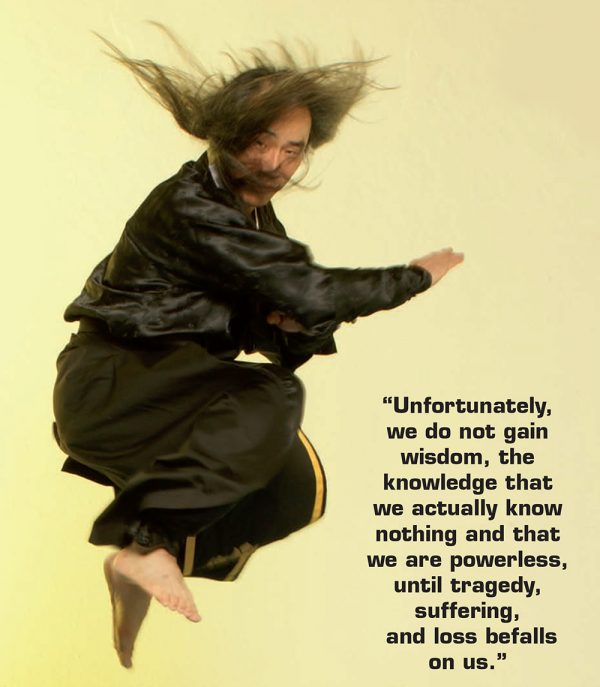Choong 충 – Loyalty “The True Meaning of Martial Art” Part 4
Published in Budo International February 2019 Issue
By: Grandmaster Taejoon Lee
Furthermore, it is important to notice that Lady Jiso did not just say no, but rather stated the “Law” (Confucian Law) of the role of the woman. She could have just followed the law as it is stated, which was that if the father had passed, being a patriarchal society that the mother had to obey the son. Therefore, she could have said to Wonsul, “Now that your father has passed, you are the man of the house so I will do as you say.” This would have solved everything for Wonsul and maybe he expected as such and that is why he requested an audience with the mother. Also, if she did that, then she would too have been happy, being reunited with her son. However, that’s not what Lady Jiso said. Instead, she said that her husband could not have had a son who is like Wonsul, therefore she has no son and hence she could not be Wonsul’s mother. This outraged Wonsul and he threw a fit of anger, yelling, crying, beating his chest, and cursing Tamnung, but Lady Jiso would not change her mind.
Wonsul’s glimpse of hope was shut down into utter darkness. The rejection from his father was expected, but for his mother to do the same was complete devastation. Wonsul had lost all hope and again he went into seclusion, cut off from all human contact for the second time.
Lady Jiso maintained her loyalty to her husband and because he died it did not absolve his mandate. Her loyalty does not die with her husband, but it dies with her. Loyalty is something that we offer, what we give to another, and it should always remain at the center of our hearts no matter what. What value would loyalty or love have if one were to only keep it when it served them, only when it pleased them and when faced with any hardship or displeasure change their mind and retract their vows? The value of loyalty, of love is derived from the extent in which one is willing to suffer to keep it.
Moreover, Lady Jiso was not only loyal to Yushin Kim, but she was loyal to what was right in her heart and as she believes her husband did what was right, so she upheld the decree. Was that easy for her? Of course not, it must have been the hardest decision, but she sacrificed her self-happiness and wellbeing for her loyalty to her husband, even after his death and in so doing to the law, to God.
In today’s society this would never happen and there would be no Wonsul, no person who would understand duty and honor, sacrificing their life for others as taught and supported by parents and the entire culture. Can you imagine today a child coming home and complaining to the mother that her teacher gave her a failing grade and that her feelings were hurt in some way, or that she lost in a game of dodge-ball, or some child said some things that offended her making her cry, and the mother tells the child to suck it up, be strong and to defend for herself? This would never happen today and it is truly unfortunate as our society, the powers at large are creating a victim culture, only blaming others and never taking accountability for themselves and their actions, incapable of independent thought, dependent on social acceptance leading to mob rule. When self-preservation is valued over self-sacrifice, we forfeit our true freedom to the delusion of being free.
Up to this point, Wonsul was acting upon what would satisfy his own conscience, his ego, his own grief and sorrows and searching for a way to relieve his misery and suffering. By having what he considered his second chance completely obliterated, he was forced to dig even deeper. The most essential question to understanding our life is an existential one. Why do we live? What are we living for? What is the meaning of life? The answer lies in whether you only value the self, that all things exist through self-perception, which means one must exercise self-assertion and self-preservation at all costs; or that there is something greater than the self, hence there is value in being selfless, pleasing the judgment of a transcendent being. What would be the point of being selfless when there’s no one to recognize that you were truly selfless? And, if you were selfless because you thought that it was the best thing to do, then in reality you were being selfish to fulfill your own self-asserted value. Therefore, you were only pleasing yourself. The only way to be truly selfless is to surrender what you value the most, the self to something beyond, which transcends all things. However, if only that which exists is the self, then there is nothing to surrender to, hence one cannot truly be selfless, only selfish.
At this moment, Wonsul must have contemplated death, suicide. What does he have to live for? His father who has disowned him has died and there’s no way to redeem himself with his father; his mother will not even sea or speak to him; his desire for glory through battle has been stained; he is a man without parents, without a King or Kingdom, then how can he even call himself a “man.” I have witnessed people with far less struggles and far less losses take their own lives too early, too soon; and some who lived a long time, with only a short step away from the inevitable take their lives because they could not bare one more day. When at the center of the heart there is only darkness and emptiness, it doesn’t matter how big, small, trite, or grand one’s good deeds and accomplishments, pain and suffering is, all that is apparent is the darkness, no way out, absence of hope, of light.
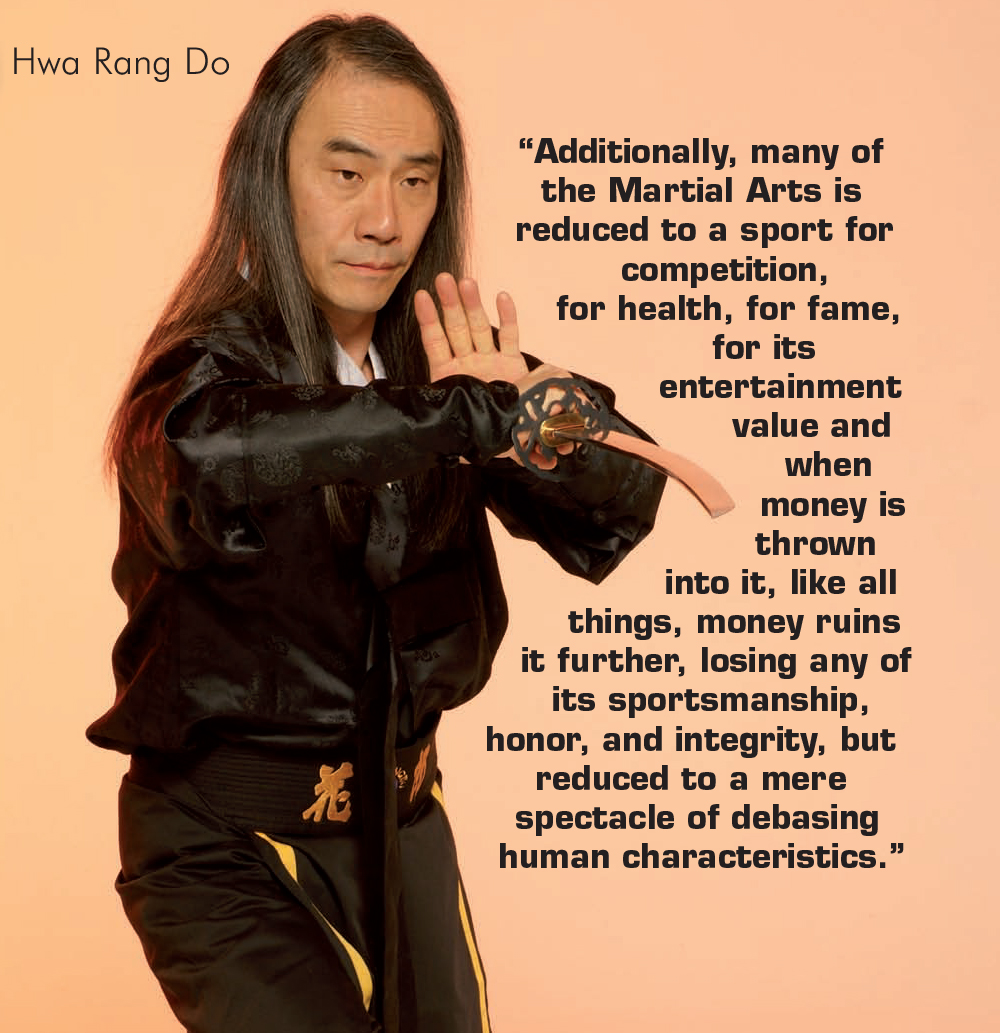
However, Wonsul did not take his own life. He laid dormant, hidden, away from all people, only in his own thoughts, delving deep into his conscience, coming into true awareness, confronting his demons and facing what is at the center of his heart. We don’t know what really went through his mind, but we can only speculate from what he did. A little over two years later, he came out of seclusion and led a Silla Army as a Hwarang General to win the decisive battle, which secured the Silla Kingdom against the Tang (Chinese) Invasion, delivering the Silla people from bondage and ensuring their freedom. The course of Korean history would have changed forever; Korea would have been lost, erased from the World if Wonsul had taken the easier path, to take his own life, but rather he lived and proved that he was not a coward.
Even as a warrior Wonsul had to live up to impossible expectations set by his father General Yushin Kim. To illustrate this, here’s one of many of Yushin Kim’s accomplishments on the battlefield. When he was younger under the command of his father (Wonsul’s Grandfather) Sohyun, fighting against the Baekje army the Silla troops endured many failed attempts at conquering Nangbi Castle. After so many casualties and deaths, the Silla soldiers lost their fighting spirit and no one would engage. Yushin Kim, who at this time was a commander for a medium sized garrison, went before his father, took off his helmet and said, “They are defeating us. But, throughout my life I have been guided by loyalty and filial piety. In the face of battle, a Hwarang must be courageous. Now, I have heard that if you shake a coat by its collar, the fur will hang straight and that if you lift up the head rope, the whole fishing net will open and it can be thrown far and wide. Let me become the collar and the head rope and shake this army.” With that, he jumped onto his horse, drew his sword, leapt over a trench and charged alone into enemy lines. He fought his way through the enemy ranks and beheaded the general. He returned back holding the Baekje General’s head up high for everyone to see. The Silla troops were inspired by Yushin’s courage and charged once more back into battle, securing a victory, beheading more than five thousand men of the Baekje army. Everybody in the besieged city, too frightened to resist, came out to surrender.
Certainly, Wonsul did not go back to battle against immeasurable odds, which many Korean historians claim was one Silla soldier against one hundred fifty Tang soldiers, to just prove his bravery and try to outdo his father. He wanted to redeem himself to die in battle, the noble death that he was robbed from. He battled fearlessly, which in turn inspired his men to secure an impossible victory. They would have faced certain defeat and Silla would have been lost forever if it weren’t for Tamnung saving Wonsul’s life at the Battle of Baeksu Castle, if it weren’t for Taegam and his son sacrificing their lives, if it weren’t for King Munmu sparing Wonsul’s life, if it weren’t for the rejection by his father, and Lady Jiso upholding her husband’s decree. The path to the final decisive victory, ensuring the safety of the Silla Kingdom and preserving the eventual formation of modern Korea was paved by tears and sorrow, by pain and suffering, by duty and honor, and by each individual upholding their loyalty founded on love, on self-sacrifice.
For many, to die young is a curse, but for Wonsul living was the curse. He would not die! It would have been a far less punishment if he was just killed in battle. Therefore, one might say that he retreated back into the forest after the battle in anger and torment. However, his next course of action for me illustrates a different narrative. Not one in which he lives out the rest of his life in anguish, but that he has made peace. Wonsul was invited to Gyeongju, the Silla Capital, to be welcomed and recognized as a hero. If Wonsul was only seeking resolution, wanting acceptance and inclusion by the people and perhaps even by his mother, then certainly he would have accepted the invitation with gladness. But, that’s not what he did. He did not return to the Capital and he would never be seen again.
Then why did he fight? He could have just remained in seclusion and lived out the rest of life as perhaps a monk or a farmer. In his last battle, Wonsul did not fight for his self-glory; he did not even fight for his father or the King and Kingdom. He fought because he was a Hwarang. He accepted the essence of who and what he was and thus he needed neither recognition nor glory. He has destroyed the self, the ego and became selfless with only God as his witness. He escaped the bounds of society and its social conventions, the enslavement of the ego and pride. He has found peace within himself by losing everyone and everything to gain wisdom.
Unfortunately, we do not gain wisdom, the knowledge that we actually know nothing and that we are powerless, until tragedy, suffering, and loss befalls on us. The ego is a self-preserving mechanism that will do whatever it takes to maintain self-preservation, even if that means to lie, delude, falsify, or vilify others for the survival of the self. It is only when the realization that the self, the ego cannot sustain control over life that we can begin to understand the Truth. With this wisdom, one can then surrender the self to gain true peace, resulting in the appreciation for life and with that gratitude learn to rejoice in living.
These are not just stories; they are true accounts of history. They are mythic as well as epic in nature, because it talks of real human struggles, which are close and dear to all our hearts and fictional tales cannot ever do justice to the truth. Wonsul became a hero and ended up saving the Kingdom from certain conquest because everyone was clear on what was at the center of his or her hearts. They all believed in a common ethos, culture, and a transcending being. They did not strive for self-pleasure, for personal happiness, they aspired to be most noble, to uphold honor, to not bring shame on themselves and their families, to be completely selfless. This would not be possible in today’s secular world. We have lost the true essence of our Martial Arts.
We no longer have Kings, Kingdoms, Generals, Ideals, but most importantly God to fight for. We fight for ourselves, for self-glory, for fame and fortune. We are not loyal to any one path, but through technology we have access to every path, every technique imaginable and the popular slogan is “do whatever works.” We have now access to so much information, but that does not mean we are any smarter, definitely not wiser. It is to the contrary. It actually makes it more difficult to discern what is true; therefore it is easier to accept that nothing can be true, surrendering to a constant state of agnosticism and skepticism in which nothing has any real value. The consequences of this reality is that it forces us to live under constant stress and anxiety derived from uncertainty and meaninglessness. The only value is what the individual perceives to be of value and whoever can assert themselves the most through the technology of the Internet, social media, allowing any and all people to have a voice, is what the majority blindly follows not on the basis of truth, but on feelings, on what makes them feel good. In fact, when a group of millennials were asked what they felt was the reason for the increase in suicide among their peers, it is not surprising that the majority of them said, “technology.”
Additionally, many of the Martial Arts is reduced to a sport for competition, for health, for fame, for its entertainment value and when money is thrown into it, like all things, money ruins it further, losing any of its sportsmanship, honor, and integrity, but reduced to a mere spectacle of debasing human characteristics. Although, there can be many benefits in training in martial arts as sport, it does not preserve the noble principles of self-sacrifice and loyalty, and at its end, it only results in self-aggrandizing, self-centered narcissism.
Today, if you were to be loyal to something or someone, whatever or whoever that maybe, you are labeled as crazy, ignorant, naïve or all the above, and plainly dismissed as archaic. If it does not serve the self-interest of the person, then it is not of any worth. Everything has become based on consumerism; what is the next best thing that can provide my wants and desires, limited to my socio-economic availability? Therefore, one strives to expand their means of attaining what they want, presupposing that we really know what we want, basically financial wealth, or in recent years, protest by taking up activism for governments to disperse income more equally throughout the general population. And, whether we choose to accept it or not, unfortunately, today’s perception of value on all things are based upon how much it’s worth monetarily? It is all reduced to what’s in it for me? How much financial gain and loss will I incur? How much happiness will I gain? And, since the prevailing ethos in a society of consumerism is that money can provide all things, leading to happiness, money is King; money, success, fame, fortune, is sadly what lies at the center of our hearts today.
Morals, ethics, the idea of what is right and wrong, what one ought to or not cannot be solely based on the idea of enhancing personal happiness. The idea of happiness is completely subjective and what makes one person happy might be a complete horror to another. We have reduced ourselves to a pleasure seeking, self-asserting, materialistic, godless culture, which in turn can only create greater divisions, tribalism, envy, jealousy, narcissistic behavior amongst its people. No wonder why in a world with so many social comforts, with so much advances in sciences and technology, the percentage of suicide amongst the young and the old have risen and we are still faced with famine, war, slavery, and poverty in the world more than ever, with no end in sight.
The core of society, the heart of civilization should be the same as what is at the center of the heart of an individual. In order to have a strong, cohesive society it must value relationships over the self; it must be of love, a love that promotes selflessness over self-assertion.
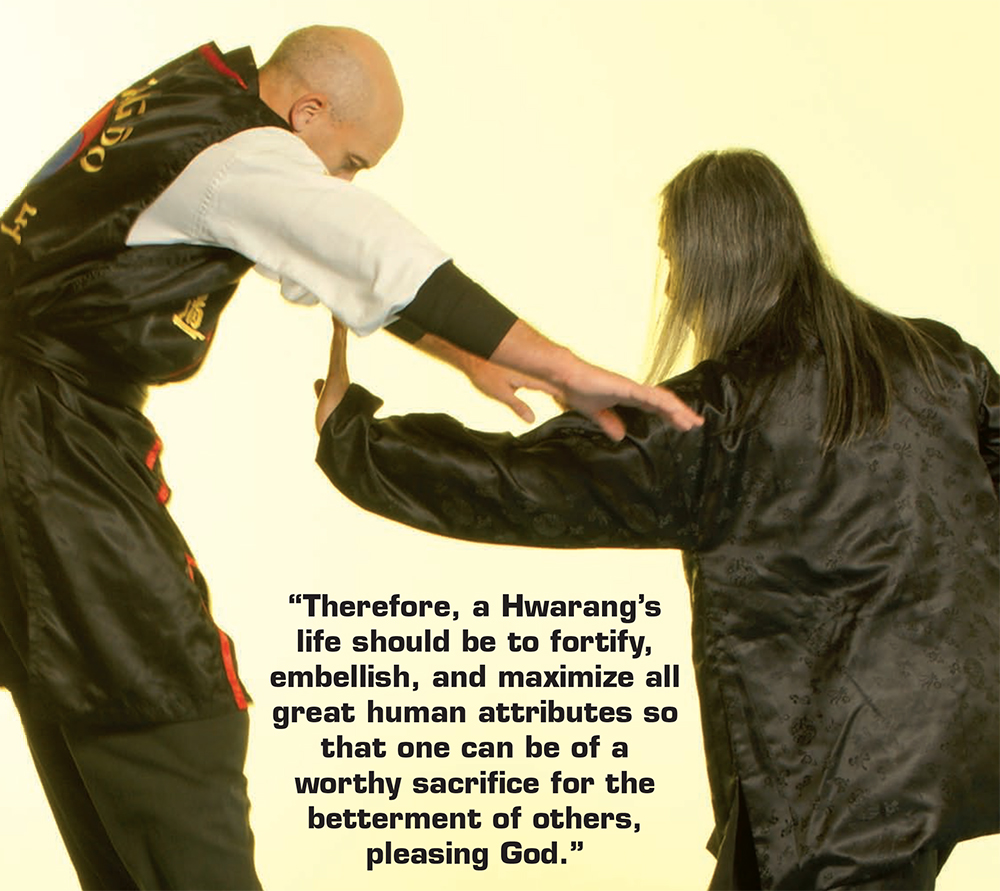
I am not going into a political or social treatise on the current state of the world. I am only pointing out the reality that as martial artists, as people, what we are faced with. And, as a martial artist in the 21st century, we have to determine what lies at the center of our hearts. What are you loyal to? What are you living for? What are you willing to die for?
Many people will say that they are loyal to the self, that they trust the self and love the self. Really, do you really trust yourself? You trust that what you know, what you see, what you hear is all true and if so, how can you even know what you know is true when you are agnostic and skeptic about everything? In order to know truth, you must build it on a foundation of truth, not on hearsay or mere assumptions of what is true. Furthermore, how many times have you lied to yourself, or broken promises to yourself, not even considering to others? We’ve all done it and I’m sure too many to count. Of course, when you do, you have an excuse, a justification on why you changed your mind, why you didn’t keep the promise to yourself, exempting fault and blame on yourself. Surely, if you accepted that the entire fault was yours for all the lies and the broken promises, then how could you even live with yourself let alone trust yourself? You have to blame others, external factors and absolve yourself of fault, of accountability? And, what is accountability: It is not the same as responsibility. Responsibility says who should do something, but accountability is who should suffer the consequences of not fulfilling the responsibility. It is usually the case that everyone wants responsibility as that gives them position and self-worth, but nobody wants to be accountable.
In fact, most people have no idea what is the Truth, but you might say that does not mean one cannot have a “personal truth.” Well then, how valuable is that personal truth of yours? Is it good for a month, a year, or as long enough until another truth comes along the way. The value of ones belief can only be measured on what they are willing to sacrifice for it, how much they are willing to suffer for it. So if you’re not willing to suffer, endure hardship, or sacrifice anything of value to maintain and uphold your belief, then what is it really worth? Nothing, it means absolutely nothing. It was only a means of giving oneself a sense of purpose and value to just survive through another day. And, certainly, you could not respect or trust anyone who constantly changes their mind without being accountable, but only justifiable, always having an excuse, the proper reason. However, it is also the case that unless you have always been true to yourself, you could not judge another person’s trustworthiness. One must be careful to choose and embrace what is true in their hearts and once it’s secured, they must be willing to lay down their lives for it. This is the Warrior’s Path.
For some, Martial Art training is a way to strive for perfection. It is a way to better oneself physically, mentally, emotionally and some arts, spiritually. First of all perfection cannot be acquired; only sought after. Therefore, contentment must come from the journey, but most are discontent because as they improve and grow stronger, their delusions of grandeur and reaching the goal of perfection also grows. And, once again the question is what lies at the center of your heart? Are you striving for perfection, trying to be godlike or are you striving to better yourself so that you may be of better service to others? It has been shown throughout history that humans who possess much power delude themselves to think that they are gods, proving the famous quotation by Lord Acton that “absolute power corrupts absolutely.” Man absolutely cannot be a god and should not be. Although we may gain strength of body and mind, we are morally corrupt and flawed. To gain power for selfish ends with best of intentions is dangerous at best, as it is said, “the road to hell is paved with good intentions.”
One can argue, disagree, find faults in every worldview, belief system, a particular person’s point of view no matter how brilliant they are. This does not negate the fact that there is a “Truth” and that Truth by its nature must be exclusive. One must continue to seek it relentlessly until they discover what is Truth as only Truth is the cure, the antidote to suffering.
The foundation of Martial Arts is Loyalty and the origins are the ancient warriors. As warriors they learn to fight, to battle, not for self-preservation, but for the protection and safety of their loved ones, their King and Country. Without a King or Country, they were nothing. They were just hired mercenaries, or killers for hire for money. They are reduced to the lowest class of human existence, without nobility, without honor. It is what they were willing to die for, that gave them value and elevated them to heroic status, rather than reduced to a common murderer.
Furthermore, the sacrificing of one’s life only has value when a human life is treasured and possesses supreme value over all things. A sacrifice of a human life would not mean anything if the person who were sacrificed didn’t care about human life. As modern day warriors, it is not that we want to die or that we should enjoy in battling, in fighting, but because we value life thus we are willing to lay down our lives so that others may live. These values can only be upheld and possess true meaning when we embrace that human life is sacred, that man was created in the image of God.
The last, fifth code of the Hwarang Okae is “to discriminate or show mercy in killing.” Actually, they were not allowed to kill or take any life, however, as being warriors they could not avoid killing. Therefore, they were to exercise compassion for even their enemies. Although, in the days of the Hwarang this was true, today we are not warriors in battle, defending a Kingdom; we are common people living ordinary lives, striving to live up to extraordinary standards. Today our enemy is all that which is evil: fear, doubt, uncertainty, hatred, hardened heart, selfishness, envy, greed, lust. Although, defeating a visible enemy requires swords and shields, the invisible enemy can only be defeated with love that is founded on the primal love of God.
I believe that through Martial Arts, we can best preserve these ideals of what is noble, precious, and essential to humanity, faith and loyalty, enhancing in each person their strength of character, conviction, and courage. For a person who is weak of spirit, doubtful in mind, and fearful at heart cannot be trusted in all things they say and do. It should be the aim for all martial arts to create honorable people who do not seek for exceptions and self-glory, but rather seek to be exceptional and selfless.
Hwa Rang Do has and will always be a Legacy of Loyalty and that loyalty is laid out in our moral, ethical code, the Hwarang Okae, as well as our Mission Statement.
Hwa Rang Do®: A Legacy of Loyalty
Relentlessly Seeking Truth
Empowering Lives
Serving Humanity
What lies at the center of Hwarangs hearts is Love, the Love which is founded on self-sacrifice, as a parent lays down their life for their children emulating God and thus God is Love. Therefore, a Hwarang’s life should be to fortify, embellish, and maximize all great human attributes so that one can be of a worthy sacrifice for the betterment of others, pleasing God.
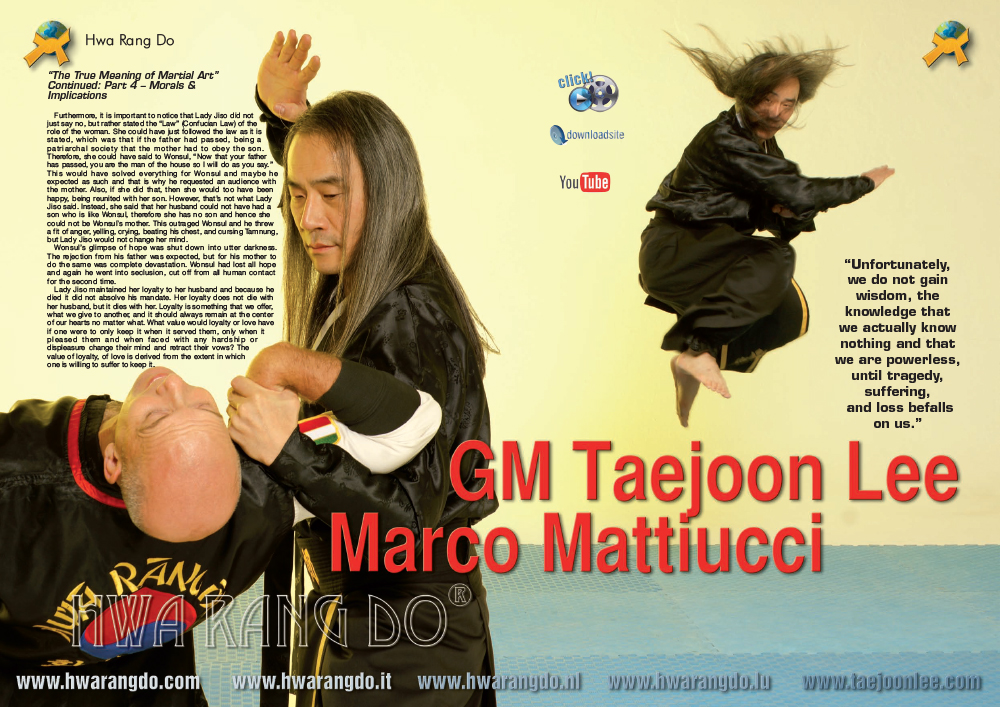
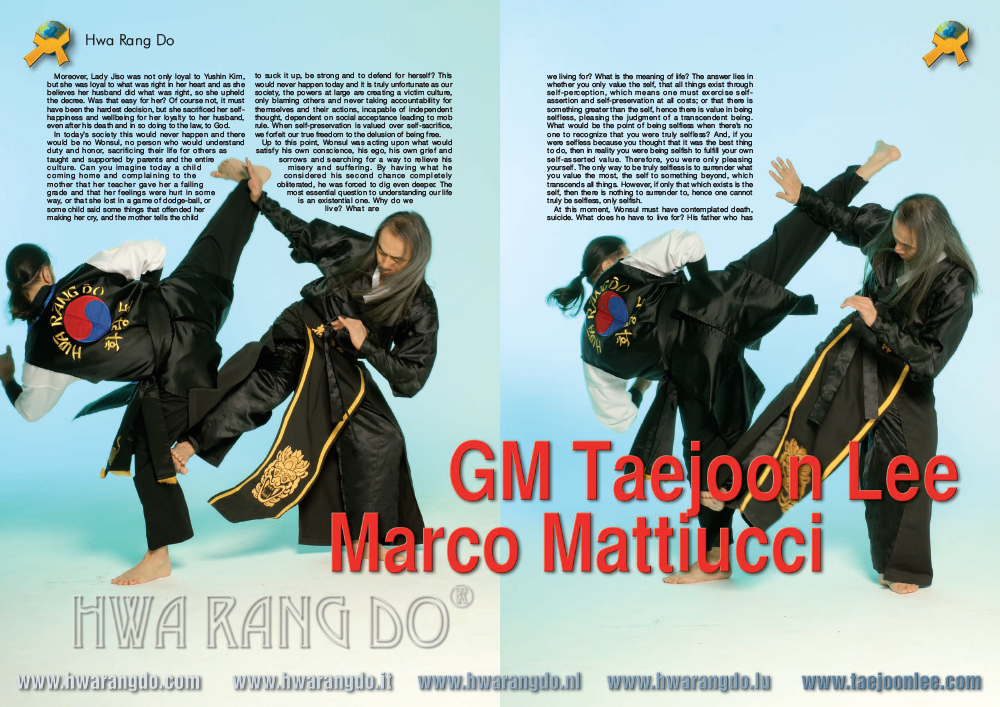
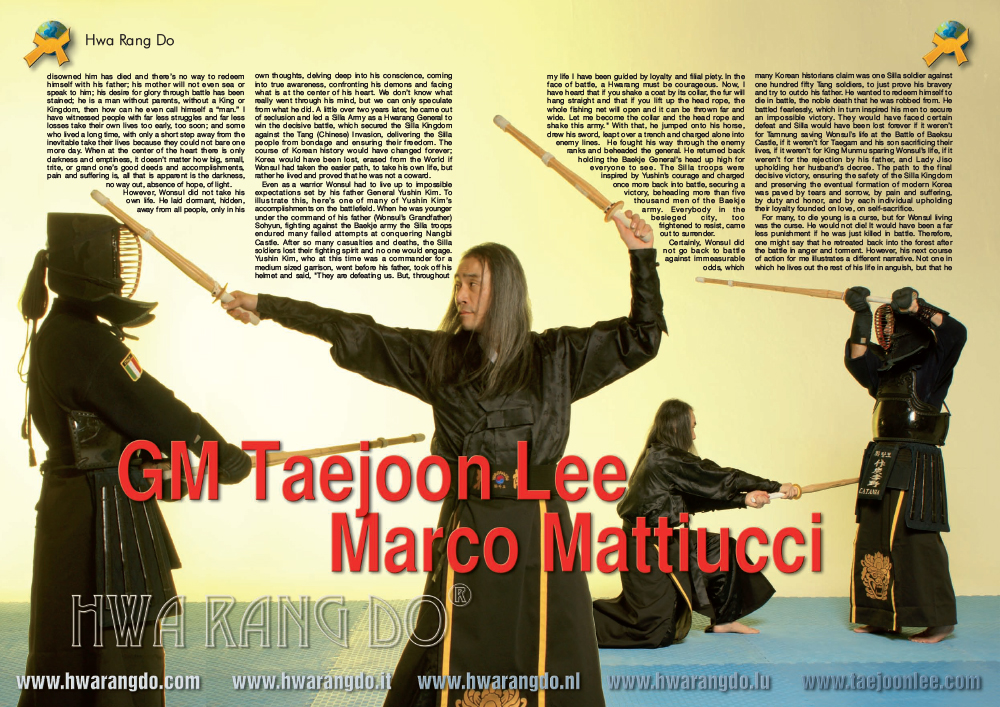
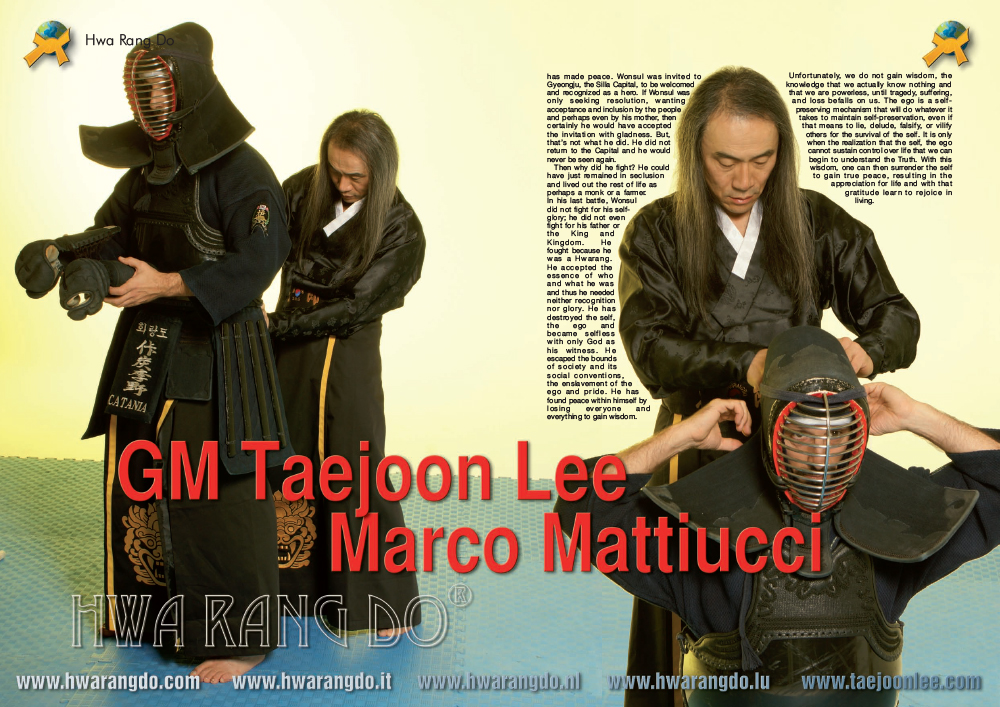
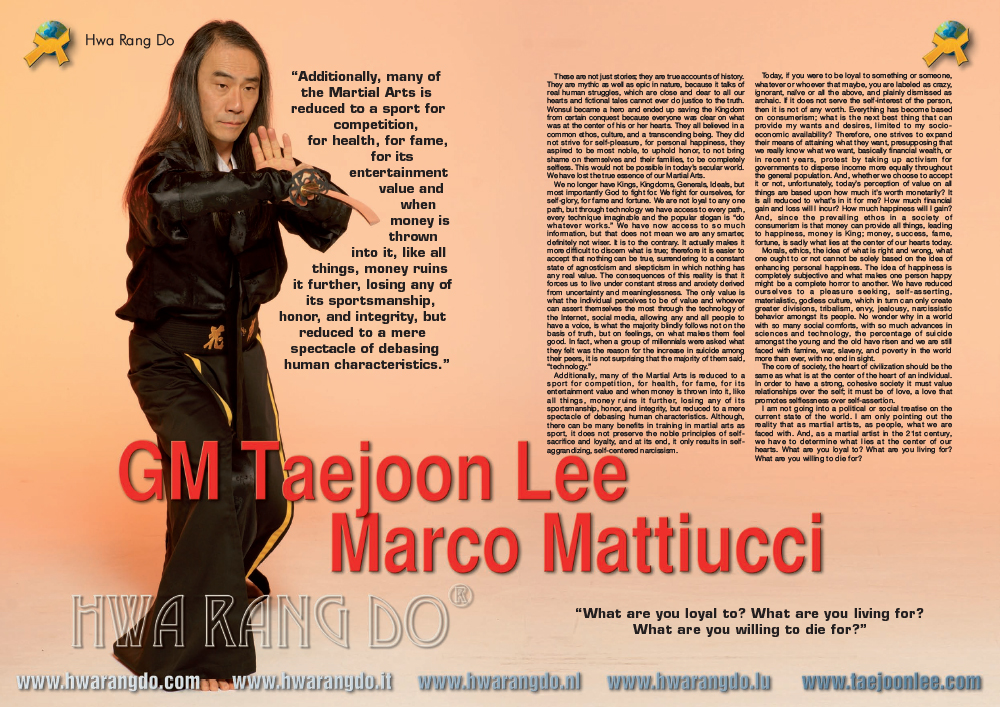
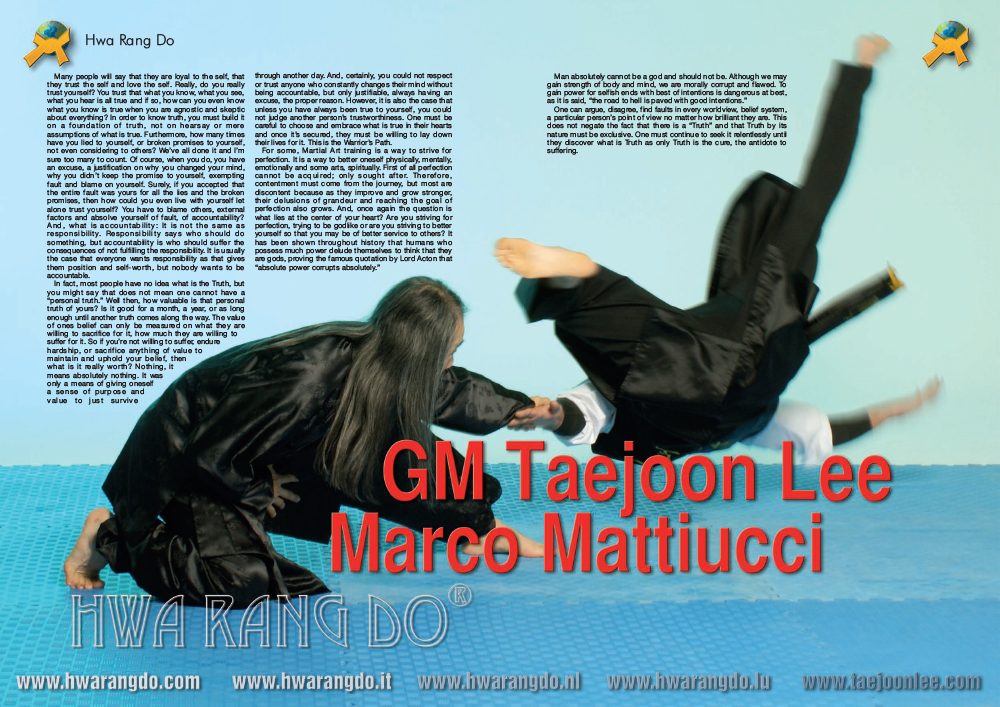
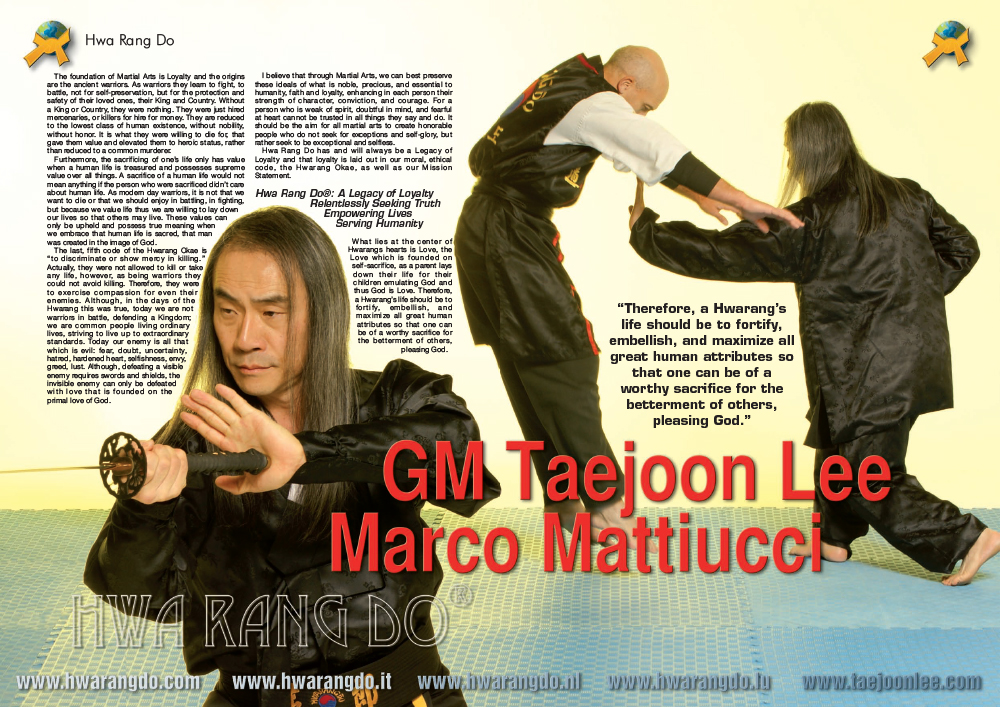
PDF: budo-2019-2feb1-choongloyaltyp4

